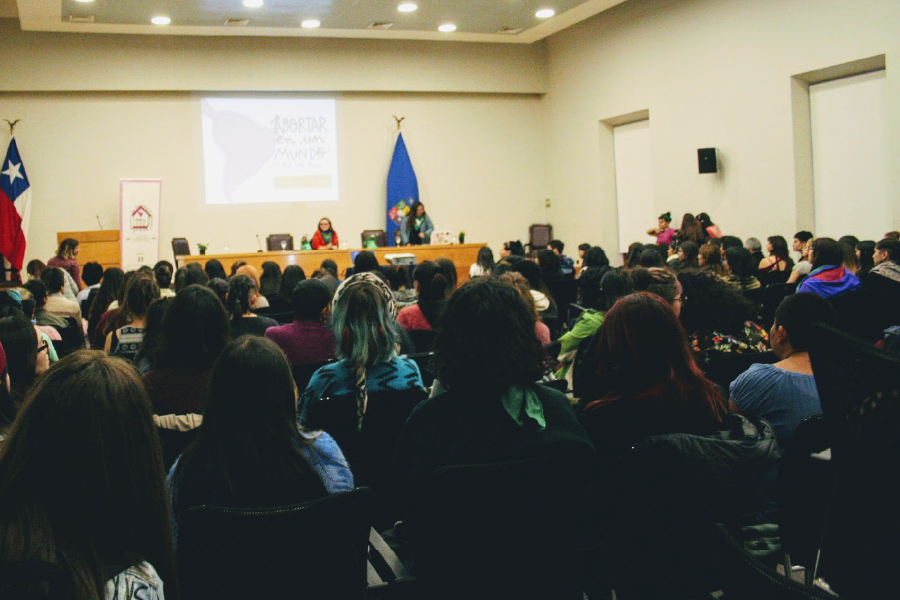Throughout the world and especially in the territory we inhabit, Abya Yala and the Caribbean, women and other people with the capacity to bear children abort and will continue to abort. We do this in spite of laws that deny us, prohibit us and place us at risk of death or permanent physical damage caused by unsafe abortions.
In this territory we live in are the countries with the most restrictive laws in the world, where indigenous and impoverished women are condemned for murder and access to abortion drugs whose safety has been known for more than 30 years.
In this territory in which we live and resist, we women abort every day, in our homes with our friends, in hospitals and clinics, in doctors' offices, in classrooms, in universities, everywhere. Everywhere. At times, we are alone, with guilt, with fear, without information, without economic means to have access to decent health care. Sometimes informed, accompanied and safe.
Laws that restrict access to safe abortion stigmatize the practice, limit access to safe procedures, increase the number of unsafe abortions that result in death or disease, and favor the illegal market for the sale of drugs and private clinics that profit from the desperation of those who need an abortion.
In spite of all this, governments have legislated as if abortion were something very complex and dangerous, as if recognizing the reproductive autonomy of women and other people with childbearing capacity were to generate social chaos, as if the State had never separated itself from the Church, because it legislates with personal religious criteria and not thinking about public health and the dignity of women and girls.
In this context, the collective of feminists accompanying abortions are accompanying, meeting and learning with the women who abort with us. We learn that there are a thousand reasons, that medical protocols are surpassed by the reality of women, that each abortion is unique, that each woman is a world. We accumulate significant experiences, we resolve situations that seemed impossible, we challenge our preconceptions, we learn to dialogue also with women from other countries, each one facing her local context, but with many coincidences in doing, in thinking, in imagining.
This is how we gather today, September 28, in Chile, one year after the enactment of a three-cause abortion law that resolves less than 3% of abortions in its territory, with a right-wing government that establishes more and more restrictions on access to public services and with conscientious objector gynecologists in regions where the most impoverished women in the country live. People are coming together as the women companions of Nicaragua resist a terrorist government that has already assassinated more than 400 people. People gather inspired by the green sea that began in Argentina and that we know will not stop, because we live in the streets of that country, that made us feel that it is possible to demand a law that gives us back the minimum of dignity that we all deserve, and that the voices of women who have abortions are shielded from misogyny.
People have been feeling linked and complicit for a long time. We understand that it is necessary and urgent that people unite to give shape to this emaranhado of strategies and knowledge. We are activists who accompany abortions in Chile, Argentina, Peru, Bolivia, Paraguay, Uruguay, Equador, Colombia, Nicaragua, El Salvador, Guatemala and Mexico. We aspire -also- to continue articulating with other countries' collectives.
This September 28th, Day of Struggle for the Decriminalization of Abortion in Latin America and the Caribbean, in Santiago, Chile, we formed the Latin American and Caribbean Feminist Network of Abortion Survivors. This is our way of resisting and creating loving policies that return abortion to the place of everyday life, as one more decision within the multiple reproductive decisions of women.
We will win the races as many times as people want.
We are many, we are everywhere and we are not afraid. We have each other.
In Latin America, the Caribbean and the whole world, free, legal, safe, free and feminist abortion.
Rede Feminista Latino-americana e Caribenha de Acompanhantes de Aborto: Con Las Amigas y en La Casa, Socorristas en Red (Feministas que Abortamos), Serena Morena, Cuerpa Autónoma, Estamos Juntas, Mujeres en el Horno - Línea Aborto Información Segura, Las Comadres, Las Parceras, Red Regional de Acompañamiento Centroamérica, Fondo de Aborto para la Justicia Social MARIA, Las Libres.
Santiago do Chile, September 2018.

